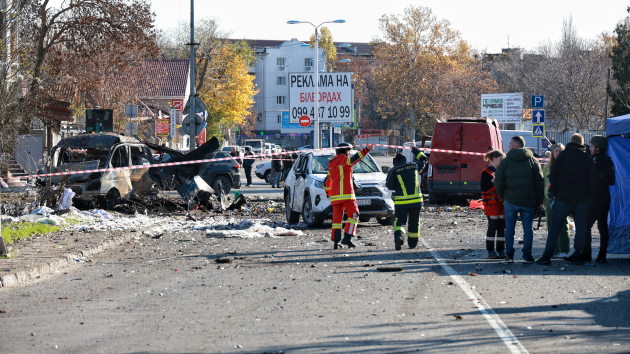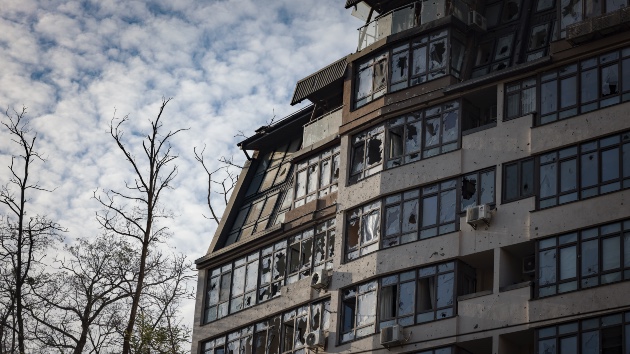Israeli defense minister predicts 2 more months of war, then ‘mop up’
Written by ABC Audio ALL RIGHTS RESERVED on December 6, 2023

(NEW YORK) — Irael’s war with Hamas in the neighboring Gaza Strip is expected to continue at its current intensity for two more months, followed by what Israeli Defense Minister Yoav Gallant called multiple months of “mop up” operations that would see the country’s military “taking out pockets of terrorist resistance.”
Gallant made the comments during a briefing with ABC News over the weekend, where, in light of multiple warnings by top U.S. officials about soaring civilian casualties in Gaza, he insisted: “Israel is not fighting the Palestinian people.”
“We are fighting the Hamas terrorist organization,” he added, echoing a message the Israel Defense Forces have delivered since the current conflict began with the Oct. 7 attack on Israel that left 1,200 dead, most of the civilians.
According to Gaza’s Hamas-run Ministry of Health, nearly 16,000 people have been killed there since the IDF launched a counteroffensive on the heels of the terrorist rampage, with the death toll rising daily. Gaza, a 140-square-mile territory, is home to some 2.3 million Palestinians who have lived under a blockade imposed by Israel and supported by Egypt since Hamas, a Palestinian militant group that the United States has designated a terrorist organization, came to power in 2007.
Last week, a seven-day truce between Israel and Hamas — mediated by Egypt, Qatar and the U.S. — ended with both sides accusing each other of violating the terms of the deal that had called for a temporary cease-fire.
Nevertheless, the truce saw the release of more than 100 Hamas-held hostages — mostly women and children, and a handful of male foreign nationals — in exchange for over 200 Palestinian prisoners and detainees who were being held in Israel, all women and teens: some of whom Israeli courts had convicted of violent crimes, and others who had been charged with more minor offenses, and some held without any charges.
During the briefing, Gallant said Israel will not return to negotiations unless Hamas fulfills the original terms of the agreement. That would mean the release of 15 more women and two children.
The hostages need to be released “with no preconditions and nothing in return,” he told ABC News.
The two Israeli children are 11-month-old Kfir Bibas and his 4-year-old brother, Ariel Bibas, whose kidnap by gunmen was one of the first videos to go viral on Oct. 7. Just a few days into the hostage-release deal, and after renewed media focus on the Bibas family, in particular Kfir, Hamas said the boys and their mother, Shiri Bibas, were killed in an Israeli airstrike that also killed their captors. The Israel Defense Forces, however, said it continues to investigate the claim.
Gallant and other Israeli military and political leaders, including Prime Minister Benjamin Netanyahu, heralded last week’s return of 110 hostages as a significant and surprising success during a press conference over the weekend.
Speaking to ABC News over the weekend from his office overlooking the Israeli military headquarters in Tel Aviv, Gallant said he is committed to bringing all the hostages home. But, he said, “the only way with Hamas is to use force,” and then, “eventually, they will give you something.”
He also said Hamas, which Israel has vowed to eliminate, “has two options” in the war — “to die in the tunnels or on the surface or surrender with no conditions.”
This stance means it’s extremely unlikely talks will resume in the foreseeable future. Salah Al-Arouri, deputy head of Hamas’ political bureau in Doha, recently told Al Jazeera that Hamas would not negotiate for the release of hostages until the end of the war.
Multiple Israeli security sources told ABC News they estimated Hamas’ pre-Oct. 7 strength at 30,000 fighters. The sources said they believe that 6,000 of them have since been killed, including over 1,000 on Oct. 7.
Gallant claimed Israeli forces had killed roughly 40% of Hamas’ brigade and battalion-level commanders in Gaza, captured hundreds of fighters and seized hundreds of terabytes of data from laptops. While he acknowledged that Israel cannot kill all Hamas fighters, he said his country’s objective is to incapacitate the organization to the extent that it will “no longer function as a military organization that can launch organized attacks against Israel.”
“We need to break the chain of command,” Gallant told ABC News, adding that a goal of the Israeli military operation is to kill Hamas’ Gaza leader, Yahya Sinwar, the former prisoner who Israel claims is the architect of the Oct. 7 attack.
Already looking to the future, Gallant said there are multiple groups in Israel’s security establishment working on “the day after,” which includes planning how to rehabilitate Gaza and which authority might control it.
Gallant said the only candidates that will not run Gaza in the future are Hamas and Israel. He and his government have insisted on severing all the infrastructural connections, including water and electricity, that until the Oct. 7 attacks, bound Israel with Gaza. This included allowing Palestinian workers into Israel. Israel had occupied the Gaza Strip from 1967 until August 2005, when it evacuated its settlements and military posts inside the strip.
While Israel’s ground forces are heavily committed in Gaza, moving more operations into the southern part of the enclave in recent days, most of the country’s air force is focused on the Hezbollah militant group in neighboring Lebanon, which has voiced support for Palestinians in besieged Gaza and has been clashing with Israeli troops along the Israel-Lebanon border in recent weeks.
The majority of the Israeli Air Force, Gallant said, is on constant standby for a Hezbollah attack, with only a small portion focused on Gaza. Israel’s military jets bomb unopposed over Gaza, but the Iran-armed Hezbollah in Lebanon is known to have sophisticated surface to air missiles that would pose a significant threat to Israel’s air force, according to multiple Israeli security sources. The Israeli military has increasingly come to see the cataclysmic destruction in northern Gaza as a deterrent to the rest of the Arab world.
Gallant, who on Oct. 11, according to a report by Israeli newspaper Haaretz, called for Israel to launch a preemptive attack against Hezbollah, told ABC News over the weekend, “We do not want a war with Hezbollah,” which is a far more formidable foe than Hamas.
Copyright © 2023, ABC Audio. All rights reserved.

 KVSP
KVSP 



